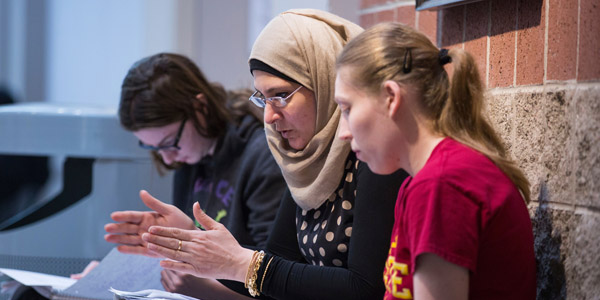
Interruption of War
Story by Bill Zahren
Images by Christopher Gannon
At age 40, Shemaa Albayati didn’t think she’d be starting over. But war has a way of interrupting even the best-laid plans.
Albayati, an Iraqi microbiologist, ed her war-torn country and rebuilt her life in Iowa, earning a bachelor’s in genetics from Iowa State in May.
Academics targeted
The Iraqi war, officially known as Operation Iraqi Freedom, began in 2003 with the invasion of forces from the United States, United Kingdom and Poland. Four years later, militants menaced large areas of Iraq.
“It was a very, very bad time,” Albayati says. “A lot of people were killed, and life was very cheap in Iraq. Someone would kill you for a hundred dollars. At any time, they (members of anti-government militant groups) could come into your home and kill anyone, and nothing would happen. Even the police were afraid of them. It was very bad, very dangerous.”
Albayati says insurgents targeted people with advanced degrees such as teachers and physicians, which put her entire family at high risk. She had a bachelor’s degree in microbiology, and her husband taught at the university.
“My mother had a degree in biology, and my father had a degree in business and taught at a university,” she says. “These were the kind of people they (terrorists) didn’t like. They wanted to destroy everything: scientists, doctors, everything.”
She and her husband, Yasir, knew they had to leave Iraq.
Emigrating to America
In 2012 they received necessary approvals for Albayati, Yasir and their children, Tawfeeq and Sarah, to get permission to emigrate. They had been very comfortable in pre-war Iraq living on Yasir’s income alone in a neighborhood where members of the two main branches of Islam—Sunnis and Shiites—lived together peacefully.
They lost all their money and possessions when they left. Even more difficult was leaving friends and family behind, including siblings and Albayati’s elderly mother.
“We appreciate America letting us come here,” she says. “There were a lot of countries near us, but they didn’t want to help us. This country helped us to start again where it would be safe for my kids.”
The family-friendly reputation of Iowa resonated with their family- and relation- ship-focused native Arab culture, so Albayati and her husband decided to come here.
Albayati is grateful to the Des Moines branch of the U.S. Committee for Refugees and Immigrants for helping them get established in an apartment in West Des Moines, where they have lived and created friendships since arriving. They are in the midst of the long process to become American citizens.
Once resettled, they faced the prospect of earning a living, something that wasn’t a problem for them back in Baghdad. Yasir, who spoke English well, got a job to support the family while Albayati, who spoke no English, set out to earn a degree similar to what she had in Iraq. Unfortunately, that meant she had to start almost from scratch.
Starting over
She first enrolled at Des Moines Area Community College (DMACC) in Des Moines where she took English as a Second Language and transfer courses. Advisers at DMACC urged Albayati to consult an adviser at Iowa State, which connected her with Lois Girton in the genetics, development and cell biology department.
Meeting twice a semester, they mapped out Albayati’s path to an associate’s degree at DMACC and a bachelor’s degree at Iowa State. Girton connected Albayati with nancial aid resources.
“Because I don’t understand how the university works here, it is so different from Iraq, I didn’t apply for any scholar- ships,” Albayati says. “Lois sent me an application for a scholarship she thought I quali ed for and I got it. I appreciate what she did.”
Girton says Albayati worked hard to succeed.
“While it was challenging to determine how best to credit her previous coursework towards her Iowa State degree program, it was always a pleasure to work with Shemaa,” Girton says. “She has a passion for excellence in everything she attempts. Without exception, her instructors give her high praise for her engagement, attitude and intelligence. She also is so grateful for any assistance she receives.”
After Albayati graduates, Yasir plans to get a credential in web design or program- ming. Meanwhile, son Tawfeeq (10th grade) and daughter Sarah (seventh grade) are thriving in the Waukee public school system.
Safe at home
Her family has encountered the occasional anti-Arabic sentiment, but that’s been rare. She says most people are welcoming and helpful. She feels safe at home in West Des Moines and at Iowa State. And, given her experiences in Iraq, safety is the top priority for Albayati and her family.
“People asked us ‘Who do you love more, Iraq or America?’ My husband says this: ‘Iraq is like my mother, and everyone loves their mother. America is like my wife, and I chose to love my wife.’ That’s the difference for us between Iraq and America.”
Albayati says she looks forward to volunteering after graduation and finding ways to serve others.
“It’s important to us to give back to our communities and friends who supported us,” she says. “We built ourselves over again here, and I know there are others in need like we were. We look forward to being active members contributing to our community.”
“We feel safe here, safe at home and at school,” Albayati says. “People have been so kind.”



